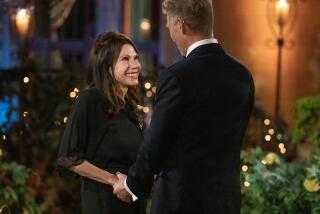Public Expresses Frustration Over Broadcast Media
Deep frustration over the media’s often frivolous and occasionally insensitive broadcasts bubbled over late last week in Los Angeles as a parade of speakers spent 4 1/2 hours imploring two federal regulators to enforce higher standards and halt any further consolidation of radio and television station ownership.
Nearly 250 people showed up for a hearing at USC , one of several across the country that will be held as the Federal Communications Commission embarks, yet again, on an overhaul of media ownership rules.
“We are right back to square one,” said Michael J. Copps, one of two FCC members at the meeting Thursday.
In 2003, the agency voted 3 to 2 to allow companies to own more TV stations across the country and to control both a station and a newspaper in the same market. After an outpouring of protest from consumer groups and others, Congress weighed in, undercutting the FCC’s action. Separately, the U.S. 3rd Circuit Court of Appeals called the new regulations unjustified and sent them back to the agency for revision.
“It was a near-disaster for the United States of America, and we cannot let that happen again,” said Copps, who, along with the other Democrat on the commission, Jonathan S. Adelstein, had voted against the rules.
The full FCC is expected to vote on the media ownership rules next year. The issue is considered a test for FCC Chairman Kevin J. Martin, who took the helm last year in the wake of the controversy.
On Thursday, Copps and Adelstein were the only two FCC members to attend the hearing, organized by the National Latino Media Council. All five had been invited.
The hearing brought into focus high levels of dissatisfaction with the media.
The two commissioners received an earful from dozens of speakers, who asserted that the consolidation of station ownership had led to a pronounced decline in in-depth news reporting, diversity of viewpoints and quality children’s programming.
Speakers, who included members of Congress, labor leaders, librarians and even a limousine driver, accused the major corporations that own broadcasting outlets of abrogating their responsibility to serve the public interest in their pursuit of profits.
Mona Mangan, president of the Writers Guild of America, East, accused the broadcasters of pandering to “the lowest common denominator” in their quest to find a large enough audience to drive ratings.
“Local television is one of the most lucrative parts of the networks,” she said. “It is the source of so much money.”
Mangan said strong reporting could benefit the community, citing the investigative coverage of unsanitary kitchens by KCBS-TV Channel 2 in 1997 that led to the A, B, C grades that now hang in restaurant windows.
“Local stories are expensive, and that type of investigation is not done anymore,” she said.
One speaker, Dave Adelson, said that searching for substantial programming on TV was like trying to get a balanced meal from a vending machine.
“The machine is filled with products made by conglomerates,” Adelson said. “You can get anything you want, except nutrition.”
The hearing was the first of four that Copps and Adelstein are planning to specifically address the concerns of Latinos. Los Angeles is home to the nation’s largest Latino population, -- 1.8 million households, according to Nielsen Media Research. The two FCC members plan other such hearings this year in New York, Chicago and Austin, Texas.
Several Latino speakers decried the practices of Spanish-language media. Major Spanish-language broadcasters typically buy much of their entertainment programming from production firms in Mexico and other Latin American countries. This practice, several speakers said, denies Latino producers, actors and writers in Los Angeles a valuable source of employment.
A few others said they were offended by the vulgarities and crass content they sometimes hear on Spanish-language radio programs. They asked the FCC to do a better job of monitoring the Spanish-language airwaves.
The most impassioned group was one affiliated with a charter school in El Sereno. In June, a talk show host on KABC-AM (790) alleged that the school’s leaders were racist separatists and called for its closure. The school received a bomb threat and had to be evacuated.
The school’s co-founder played an audio tape of the KABC broadcast, and demanded that the FCC revoke the station’s license. One father accused the station of spreading hate and lies.
“They threatened the lives of our children,” he cried out, his booming voice filling the conference room.
KABC executives did not return calls seeking comment Friday, and executives at parent firm Walt Disney Co. declined to comment.
On Friday, Adelstein said he was alarmed by what he heard and would investigate the matter further. He said he was impressed by the turnout and the variety of issues raised at the hearing.
“This was a powerful statement of the deep level of concern within the Hispanic community about the state of the media in Los Angeles,” he said. “The frustration is understandable.”
*
More to Read
The biggest entertainment stories
Get our big stories about Hollywood, film, television, music, arts, culture and more right in your inbox as soon as they publish.
You may occasionally receive promotional content from the Los Angeles Times.







